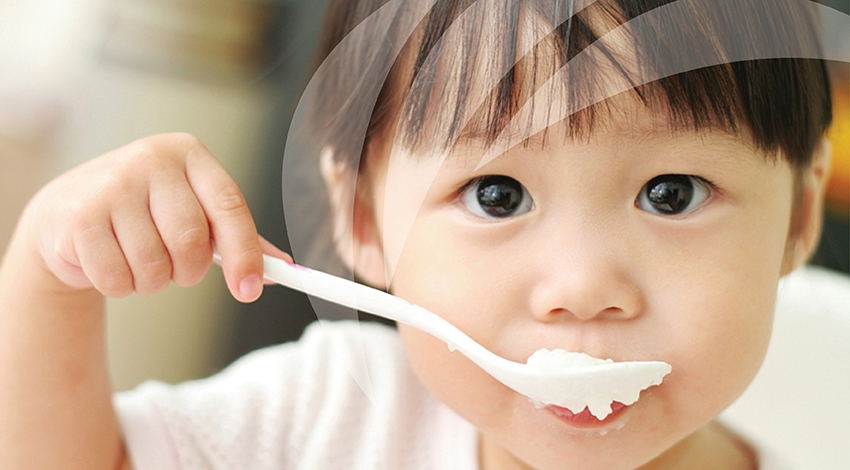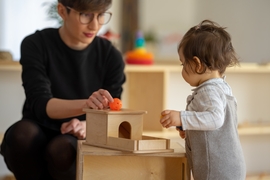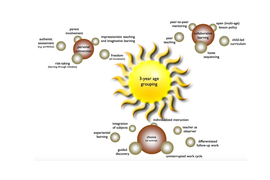
Parenting is one of the most rewarding and challenging roles we play as adults. Our society has high expectations of parents and yet we are not always able to access the resources we need to become the parent we want to be. Montessori can offer you a parenting framework from birth to maturity. It is more than an educational method; it is an approach to supporting the full development of your child.
The following are some simple, yet effective ways in which adults can support the development of a young baby.
The first six months
‘Breastfeeding is an unequalled way of providing ideal food for the healthy growth and development of infants; it is also an integral part of the reproductive process with important implications for the health of mothers. Review of evidence has shown that, on a population basis, exclusive breastfeeding for 6 months is the optimal way of feeding infants. Thereafter infants should receive complementary foods with continued breastfeeding up to 2 years of age or beyond.’ (World Health Organisation).
If breastfeeding is not an option, we recommend this great article from Pregnancy to Parenting: Bottle Feeding Your New Baby
- Feeding can be an intimate time for the carer and baby and presents an opportunity to strengthen the social and emotional connection with your child.
- Find a quiet place to feed your baby with no distractions.
- Changing the side on which your baby feeds is a natural part of breastfeeding. However it is also a useful thing to do if you are bottle feeding, as it gives each side of your baby’s body the same opportunity for work, e.g. fine and gross motor movement and eye-to-eye contact.
When to introduce foods:
The World Health Organisation recommends that all infants should start receiving foods in addition to breast milk from six months onwards. Your baby will tell you when she is ready for family foods. Look out for the following signs:
- can roll over
- can sit up
- can support own head weight
- is interested in food
- is not pushing food out of month with tongue
Starting on Solid Foods
- Babies should start receiving complementary foods at six months of age in addition to breast milk. Initially this should be two or three times per day.
- All infants should be given allergenic solid foods including peanut butter, cooked egg and dairy and wheat products in the first year of life. This includes infants at high risk of allergy (Australian Infant Feeding Guidelines).
- Starting on solid foods is an important developmental milestone. It is a time in which your baby will come to realise she is separate from her carer/s and can get her food from another source.
- Offer a fruit or vegetable mashed with a little cooled boiled water to make a runny puree.
- Use two spoons to feed your baby - one you can give to her and one you hold. She will automatically grasp her spoon from the start and will bring it to her mouth to feel it.
- In time, you can begin to alternate spoons (if your child will let hers go). Place food on one, and give it to her and guide her hand into her mouth. As she is eating this, put food on the other spoon and continue.
- As your child gains experience and her food becomes less pureed and more mashed, guide her hand with the spoon and dip it into food so she can learn how to put food on her own spoon and put it into her mouth.
- Be prepared – things may get messy as your child learns to feed herself.
- By the time your baby is 9-11 months old, she should be offered complimentary foods three to four times per day and after 12 months, she can also be offered additional nutritious snack once or twice a day.
- By 12 months of age, your child’s food should be a similar consistency to yours. Chewing is good for your baby’s jaw muscles and language development.
Finger Food
- Once your child has moved from pureed food to more solid food, introduce finger food. This can include toast or part-boiled vegetables, soft mushy fruit or chunks of tender meat/fish.
- Eating is a survival skill and it’s important your child participates in feeding herself from the start. Encourage your child to eat by herself by allowing her to put the food into her own mouth when she is ready.
- Food is also a sensory experience for your child. It’s good for her fine motor skills to pick up her own food and get it to her mouth.
Drinking
- Breast or formula milk is good for your child, but as your child starts to eat solid food, she will need less milk
- If you breastfeed you may never need to give your child a bottle. She can drink from a cup with help once she is about six months old and able to sit up independently.
- You can introduce cooled boiled water to your child once she has started solid food.
- Cows' milk should not be given as a drink until a baby is over 12 months of age.
- Introduce water in a small cup. Help your child place both hands around the cup and bring gently to her mouth for a sip.
- At around 12 months of age, you can introduce a small jug for your child to pour water from into her cup. Only place a small amount in the jug to start - around half the cupful.
- Sweet drinks, such as juice, cordial and soft drinks, are not recommended for children.
Your Child’s Teeth
- Cleaning and brushing teeth removes plaque (the build up on teeth) that causes tooth decay.
- You can start cleaning your baby’s teeth when they appear, with a soft cloth or brushing with a small soft toothbrush and water.
- Clean all surfaces of the teeth and gums twice a day (after breakfast and before bed).
- At 18 months start using a pea sized amount of low-fluoride toothpaste and encourage your child to spit out toothpaste after brushing.
- Children will need to be supervised when brushing their teeth until the age of seven or eight years.
- Children should have an oral health assessment by two years of age. This could be done by a dentist, oral health professional or by your Maternal and Child Health Nurse or Doctor.
- Lollies, chocolate or sugary drinks can cause tooth decay.
References:
National Health and Medical Research Council 2012, Infant Feeding Guidelines. Australian Government, Canberra. (Available at http://www.nhmrc.gov.au/guidelines/publications/n56
World Health Organisation, Exclusive Breastfeeding. http://www.who.int/nutrition/topics/exclusive_breastfeeding/en/



